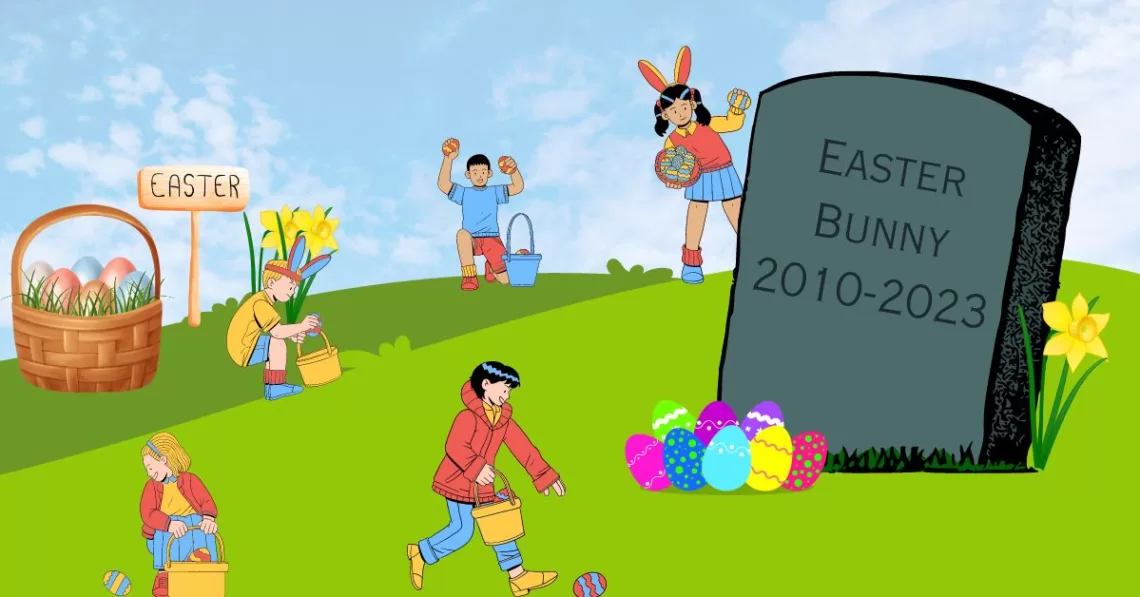
We’ve killed the Easter Bunny
After years of hidden chocolatey joy, an unsettling new development has rocked our family. We’ve killed the Easter Bunny.
For years, the legend of the Easter Bunny has gone unquestioned. Hiding chocolate eggs around our garden to the delight of our children, he has sat comfortably side-by-side with Father Christmas as an ever-present provider of festive magic.
This year, however, the question of whether the Easter Bunny is real has resulted in his tragic demise.
At 12 and 10-years-old our children have been questioning the legitimacy of the Easter Bunny for some time.
Calling into question the viability of a small, carrot-addicted woodland creature, with no opposable thumbs, managing the task of hiding fragile eggs in millions of gardens across the world, it’s fair to say the children’s belief has been wavering.
Our 12-year-old hasn’t believed for a couple of years, but he has been humouring his younger sister – who has been hanging on out of fear of losing chocolate – and consequently keeping the Easter Bunny alive, up to this point.
This year, though, neither of them seem to believe and it seems the Easter Bunny’s fate has been sealed, his legend cast aside as mere parental fantasy.
“Yeah, right Dad,” is the saracastic response I now get when raising the subject of the Bunny. “We know it’s you. You buy the eggs in Tesco!”
But, despite the Bunny having all four paws and a fluffy tail in the grave, my wife and I are still struggling to admit to them that it’s all a lie. It feels too sad, to bring an absolute end to that beautiful, unspoiled and innocent childhood time.
Having said that, the Easter Bunny feels like the least important of the childhood belief trinity; Claus, Tooth and Bunny.
If disbelief is to be staggered, I would suggest that it should always be the Easter Bunny first, followed by the Tooth Fairy and then – and only after every possible step has been taken to maintain belief – Father Christmas.
The concept of the Easter Bunny is the most ridiculous of the trio after all. Why is it even a bunny? And where does a rabbit feature in the Easter story? I must have missed that Sunday school class.
Bunny origins
Unsurprisingly, the origin of the Easter Bunny is not entirely clear, but it is believed to have come from pre-Christian traditions in Europe.
In pagan cultures, the hare was a symbol of fertility and rebirth, more than likely due to its ability to reproduce at speed. These symbols, meanwhile, were associated with the spring equinox.
When Christianity spread throughout Europe, many pagan symbols and traditions were adopted into Christian celebrations, including the randy hare.
Over time, the hare became associated specifically with Easter and it eventually evolved into the Easter bunny, a friendly and beloved character that somehow magically brings chocolate eggs and treats to children.
Parental conspiracy
For parents, meanwhile, the Easter Bunny provides a far bigger challenge than FC or the tooth fairy, primarily because children are awake on Easter Day.
The doing of the Bunny’s work therefore requires high levels of deception, with the recruitment of co conspirators, extensive lying and distraction techniques all required.
Once locations have been agreed and specific areas designated to children, someone has to find an excuse for closing the curtains and disappearing mysteriously for 15 minutes.
An urgent work call, perhaps, or an unexpected need to pop round and see the neighbours. Whatever the reason, someone else is then required to distract chocolate hungry children indoors, while the egg hunt work is underway.
It is essential that the person left with the children is a convincing liar as, at this point, they will be peppered with questions as to the missing parent’s suspicious whereabouts on such a significant morning.
But, should the distractor survive the interrogation, the end result is worthwhile. The Easter egg hunt itself is a joyous experience, providing each child stays strictly within their designated area.
You can be certain afterwards that siblings will count and examine eggs closely, to ensure equilibrium in terms of size and number. So, ensuring no eagle eyed little ones step over their boundaries will save any upset down the line.
Once baskets are full though, the real challenge for parents begins – stopping children from making themselves sick.
Presented with a pile of attractively wrapped chocolate, children’s natural instinct is to attempt to eat as much of it as possible before their parents realise. As well as the very real possibility of actually being sick, the resulting sugar high is the largest of the year, with little ones bouncing off the walls for the remainder of Easter Day.
To this end it could well be argued that the Easter Bunny is, in fact, the worst of the belief trio. While FC and the Tooth Fairy bring gifts and cash, Bunny brings a surefire recipe for family strife and bad behaviour.
Why couldn’t that Pagan hare have evolved into a bunny that playfully encouraged children to do their homework, or to tidy away after dinner without being asked seven times?
Belief is irrelevant
Regardless of whether or not our children believe, however, my wife and I have decided that we aren’t ever going to tell them outright that we have been hiding the eggs for all these years. The magic of Easter and Christmas is wonderful when the innocence of youth means that there is never any doubt. But, when doubt creeps in and belief is questioned, it’s arguably even more important to continue with the traditions.
Reminding your growing offspring of their younger years and maintaining that safe family space, complete with its quirks and traditions, will hopefully mean that the fun of the innocent years can continue into the older ones.
Just handing over an Easter egg or two to our children, even into their teens, doesn’t seem right. So, we’ll be making them hunt for them for years to come, for the sheer hell of it and in loving memory of the dearly departed Easter Bunny.
Happy Easter.
Read next: Happy parenting – 10 moments of magic





One Comment
Michelle (Boomer Eco Crusader)
It is kind of sad when our kids lose the magic of the Easter Bunny and Santa Claus. My younger daughter is almost 20 and I think last year was the first year we didn’t do an egg hunt. It’s good to continue these fun traditions.